
Cloud VoIP: Facts, Tips, and Data
 Updated on
Updated on
 By Rob Marquez
By Rob Marquez
Rob Marquez
Originally from Southern California, Rob moved to Denver over 4 years ago to join the Ringy team as a Mobile Engineer. Rob received his BS and MS in C...
learn more
Rob Marquez
Originally from Southern California, Rob moved to Denver over 4 years ago to join the Ringy team as a Mobile Engineer. Rob received his BS and MS in C...
Table of Contents
Table of Contents
Have you heard about cloud VoIP on the grapevine?
Odds are that you have. And not just once.
After all, it's a $30 billion industry that's set to grow an impressive 15% per year until 2025. If we had to describe it with a single phrase, we'd say, “it's a big deal for organizations of all sizes.”
But what is it? And why is it so important? And is it right for me?
Great questions. Does this graphic help?
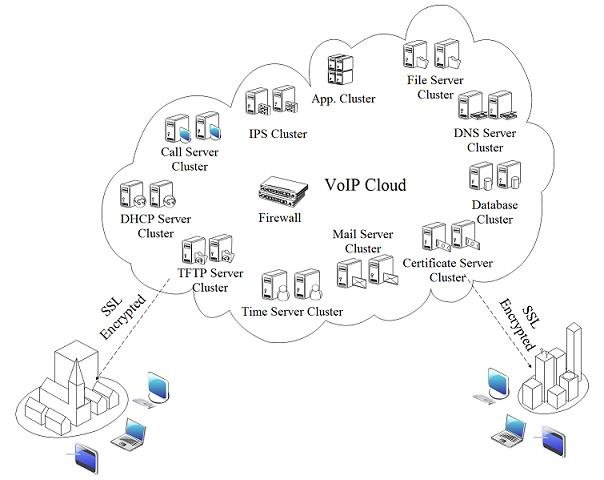
Absolutely not, right?
We thought so. Descriptions of VoIP cloud services are often overly techy and confusing, especially if you don't have any experience with these systems.
Luckily for you, you don't need to understand any of this stuff.
So in the name of simplicity and better comms, we've compiled this guide on cloud VoIP, where you'll learn everything an end-user needs to know (and nothing more).
Before we start, here's a cheeky sneak preview of today's post:
- What is cloud VoIP?
- Five fun facts about cloud based VoIP
- The benefits of a VoIP cloud service
- Five handy purchasing tips
- The top five service providers
- Cloud VoIP FAQs
Let's get going.
What is Cloud VoIP?
To really answer this question, we need to break the expression “cloud VoIP” into two parts.
First, what is the cloud?
Answer: The cloud has nothing to do with the fluffy things in the sky. It's simply a word that refers to software and services that are hosted via a third-party's servers instead of locally. You access these programs via the internet, usually in the form of a web browser.
Second, what is VoIP?
Answer: VoIP (Voice over Internet Protocol) is a technology that allows you to place voice calls over the internet instead of relying on traditional phone lines.
Now, if we bring it together, we can say:
Cloud VoIP (a.k.a. hosted VoIP) is a software solution that enables people to make calls over the internet without owning, hosting, and maintaining any hardware and software.
You can make calls through a VoIP softphone (a software app that lets you dial from any device connected to the internet), a VoIP hardphone (literally a VoIP-enabled phone on your desk), or a combination of the two.
They also come with a wealth of other features that go beyond simply making voice calls, including:
- Voicemail
- Call forwarding
- SMS (including automation)
- Caller ID
- Video calling
- Conference calling
- Call analytics
Are you satisfied with our answer?
Yes — move on to the next section; it's going to be a blast.
No — spend five more minutes learning about VoIP here, but promise to rush back.
How Does Cloud-Based VoIP Work?
Cloud-Based VoIP begins with an analog-to-digital conversion, where your voice is transformed into digital data through an analog-to-digital converter. This digital voice data is then segmented into small packets, each containing a piece of the audio signal and essential source and destination information.
These data packets embark on a journey across the internet, traversing various types of internet connections such as broadband, Wi-Fi, or mobile networks. During this journey, they may take different routes but eventually reach their intended destination, where they are meticulously reassembled in the correct order.
At this point, the digital data is transformed into an analog signal, played through the recipient's phone or computer speakers, enabling real-time, seamless communication between callers. This process embodies the fundamental workings of Cloud-Based VoIP, offering flexibility and efficiency in modern voice communication.
Cloud VoIP versus PBX: Comparison
Here's a brief comparison between Cloud-Based VoIP and PBX (Private Branch Exchange), which is a traditional phone system:
|
Aspect |
Cloud VoIP |
PBX |
|
Infrastructure |
Relies on the Internet and cloud-based servers for call processing and storage. |
Uses physical hardware and dedicated phone lines within an organization. |
|
Cost |
Generally more cost-effective, with lower upfront costs and pay-as-you-go pricing. |
Often involves higher upfront hardware and installation costs. |
|
Scalability |
Easily scalable up or down to accommodate changing business needs. |
Expansion may require additional hardware and can be less flexible. |
|
Maintenance |
Managed by the VoIP service provider, reducing the need for in-house IT support. |
Requires on-site maintenance and IT support. |
|
Features and Integration |
Offers a wide range of features, including video conferencing, voicemail-to-email, and integration with other software. |
May have limited features and integration capabilities. |
5 Facts About Cloud Based VoIP
1. VoIP Technology Is a Lot Older Than You Might Think
How old do you think VoIP is?
10? 20? 30?
Guess again, it's actually 50 years old (as of 2023).
Yup, the first one-sided VoIP call was made way back in 1973, and we only had to wait an extra year for the first two-way call to take place in 1974.
Then what took it so long to break into the mainstream?
VoIP had to wait for the internet to catch up.
Those early calls relied on a super-advanced (for the times) US military research network called ARPANET, and that type of technology wasn't available to the public for decades.
VoIP took off when high-speed internet connections became commonplace in the 2000s.
Extra fun fact: the first cloud based VoIP service for businesses was founded in 1995.
2. VoIP Calls Were Once Funded by Intrusive Adverts
Believe it or not, early commercial VoIP calls played ads before, after, and during calls.
For realz, player?
You bet your bottom dollar.
In the 1990s, when commercial VoIP was just getting started, the technology was so expensive that providers needed to use adverts as an alternative source of cash flow.
It was a bit like a 90s version of YouTube. Listen to some ads, and make some calls.
But fortunately for us, VoIP calls started falling, and this intrusive business model fell into the only place it deserved oblivion.
3. There Are Two Types of Cloud Based VoIP Numbers
Did you know that there are two main types of VoIP numbers?
Well, it's true.
We can separate VoIP phone numbers into:
- Fixed — linked to a physical address
- Non fixed — not linked to a physical address
Non-fixed numbers are more commonly used because they're cheaper, easier to obtain, and more flexible. They used to be less secure, but tech advancements have leveled the playing field.
However, many companies still stick with fixed numbers because they're the best solution for connecting an existing PBX system to VoIP via SIP trunking.
4. You Can't Tell the Difference Between VoIP and Traditional Calls
In the past, people could quickly tell the difference between a traditional copper line and a VoIP-powered connection. VoIP calls were plagued by:
- Poor audio quality
- Choppy conversations with missing words
- Dropped calls
- Annoying adverts
But that was because of slow, unstable internet connections — luckily a thing of the past for 99% of businesses.
And that means, nowadays, it's impossible to distinguish between a cloud based VoIP service and a traditional phone line.
What's more, if you're faced with a choppy line today, the culprit is far more likely to be a copper connection as VoIP has surpassed its master in terms of call quality and reliability.
5. You Don't Actually Need a Phone To Make a VoIP Call
We've alluded to this one in our definition of the term “cloud VoIP.” Remember?
You probably do because it's worth remembering.
You can make phone calls from your phone using a VoIP softphone that doesn't even remotely utilize your phone's built-in calling capabilities. Mindblowing.
It works because the VoIP softphone is simply an internet-connected app that uses the web to place the call.
This has the added benefit of allowing you to download and use the app on many other devices, including:
- Physical VoIP phones
- Computers
- Smartphones
- Tablets
- Smart TVs
- Smartwatches
Sooner or later, we hope to be adding smart fridges to this list.
6 Benefits of a VoIP Cloud Service
Cloud VoIP offers numerous advantages over traditional landline phone systems. In this section, we'll look at the key benefits of using cloud-based VoIP.
1. Costs Less Than a Landline
One of the primary advantages of cloud-based VoIP services is their significant cost savings compared to traditional landline phone systems. Research conducted by the Federal Communications Commission (FCC) indicates that businesses can save up to 40% on local calls and up to 90% on international calls when using VoIP services over conventional landlines.
This cost reduction is attributed to using existing internet infrastructure, eliminating the need for separate phone lines and costly maintenance.
2. Offers More Features and Functionality Over Traditional Phone Systems
Cloud-based VoIP services are packed with an array of advanced features and functionalities that go beyond what traditional phone systems can offer.
For instance, these services often include call forwarding, voicemail-to-email transcription, video conferencing, and interactive voice response (IVR) systems.
Such features not only enhance communication efficiency but also contribute to improving customer service. Numerous businesses have reported significant improvements in their phone call management (67%), enhanced message handling (63%), and increased remote work capabilities (57%) thanks to the adoption of VoIP technology.
3. Scalable to Support Large Teams
Scalability is a crucial benefit of cloud-based VoIP services. Whether you are a small startup or a large enterprise, you can easily scale your VoIP system to accommodate your changing needs. This scalability allows businesses to add or remove phone lines and features as necessary without the hassle of rewiring or costly installations.
4. Increased Accessibility
Cloud-based VoIP services offer unparalleled accessibility, enabling employees to make and receive calls virtually anywhere with an internet connection. This level of mobility is particularly beneficial for remote work arrangements, as it allows employees to stay connected to the office no matter where they are located.
5. Clear Voice Quality
Voice quality is paramount in business communication, and cloud-based VoIP services deliver crystal-clear audio quality. Advanced codecs and QoS (Quality of Service) mechanisms prioritize voice traffic, ensuring that calls remain uninterrupted and with minimal latency.
For example, consider a customer service call center. With VoIP, agents can engage in crystal-clear conversations with customers, reducing misunderstandings and enhancing the overall customer experience. This clear voice quality is essential for professional communication, client relationships, and collaboration among team members.
6. Hardware Flexibility
Cloud-based VoIP services offer hardware flexibility, allowing businesses to choose from a wide range of devices to make and receive calls. Employees can use traditional desk phones, softphones (software-based phone applications), or mobile devices. This flexibility reduces the need for expensive proprietary hardware and enables employees to work on their preferred devices.
5 Tips for Picking the Best Cloud VoIP Service
1. Think Carefully About Pricing, Features, and All-in-One Solutions
Don't fall into this mistake:
It could cost your business much more than you'd be saving on your VoIP provider.
And while price deserves to be one of our biggest concerns, it shouldn't be the only thing swaying our decision. No matter how tight (or wide) our budgets are.
If you go for a premium product, you might overpay for features you don't need, and if you go for a budget product, you might miss out on ones that would simplify your workday.
So rather than taking a price-first approach, we advise you to focus on what really matters - your business process and the VoIP features that would best support them.
This is what we'd do if we were in your shoes:
- Review our processes and speak to the end-users
- Make a requirements list for the cloud based VoIP solution
- Research products that fit both our budget and our requirements list
- Make a shortlist of top contenders
- Check customer stories
- Trial a few providers
- Sign up for a service
Give it a go; we promise it'll work.
Pro tip 1: Don't forget about bundles or all-in-one VoIP software that helps lower your costs and reduce billing complexity by combining several programs into one.
2. A Mobile App Is Necessary Regardless of Your Business Type
It's 2021, and people use smartphones all the time.
And no, that's not just a figure of speech.
People literally use them for an incredible 5.4 hours every single day.
And guess what? Like it or not, they'll use them for work and dialing their customers, so you need to get with the times and give your staff a VoIP application they can use on any device.
This will allow them to use VoIP whenever and wherever they desire, saving them on expensive mobile phone bills and making their lives easier.
Pro tip 2: take advantage of “find me/follow me” call forwarding to receive incoming phone calls across all your VoIP-enabled devices.
3. Check (and Upgrade) Your Bandwidth Before Switching to VoIP
VoIP needs high-quality bandwidth, so if you don't have enough, your VoIP system's performance will suffer.
There's no amount of complaining to your service provider that'll fix it.
It's as simple as that.
But what can you do to ensure that'll never be you?
Check for the following things before you sign up for cloud VoIP service:
- Your connection is free from too much jitter and latency.
- You have two internet circuits, one for VoIP-only traffic and one for everything else.
- You have an internet provider that delivers enough upstream bandwidth — a minimum of 180 Kbps for voice-only and 1.8Mbps for voice and video together.
- Your firewall is not inadvertently slowing you down as it scans for threats.
When you've sorted all four points, you'll be ready for a problem-free VoIP calling experience.
4. Pick a Provider That Offers More Than Just VoIP Calling
Remember all the nifty features we listed a few hundred words back in the VoIP benefits table?
You know, things like:
- SMS texting
- Automation
- Video conferencing
- Voicemail
- Caller ID
- Local numbers
- Toll-free numbers
- Integrations with other business software
Well, make sure they aren't just theoretical benefits by picking a VoIP provider that empowers your team with all these and more in their package.
But be careful not to overpay for things you don't need — but we're not worried; we've been over this already.
5. Consider Whether or Not You Need Calling Groups
Whether or not I need what?
Calling groups (a.k.a. call groups or ring groups).
It's a call center concept where you route inbound calls into a group of agents that share the same skill, department, or experience to improve customer experience.
For example, you could place all your CRM sales staff in the “CRM sales” group.
Your cloud based VoIP provider would then route any sales calls about CRMs into this predefined calling group to reduce waiting times and the need to transfer them manually.
It looks like this:

Just look at how happy that customer is!
And that smile is the reason many business call centers utilize this strategy to:
- Reduce transfer and resolution times (two of the most significant areas of customer dissatisfaction according to Zendesk)
- Maximize agent productivity
- Manage call overflow more effectively
It's pretty helpful stuff, but it's not for everyone — double-check you need it before forking over any extra $$ for it!
The Top 5 VoIP Cloud Service Providers
Drumroll, please.
🥁🥁🥁🥁🥁🥁🥁🥁🥁🥁🥁🥁🥁🥁🥁🥁🥁🥁🥁🥁🥁🥁🥁🥁🥁🥁🥁🥁🥁🥁🥁🥁
Thank you.
It's time to put the five tips you've just learned to good use and have a look at the best of the best when it comes to cloud VoIP.
1. Ringy (that's us!)
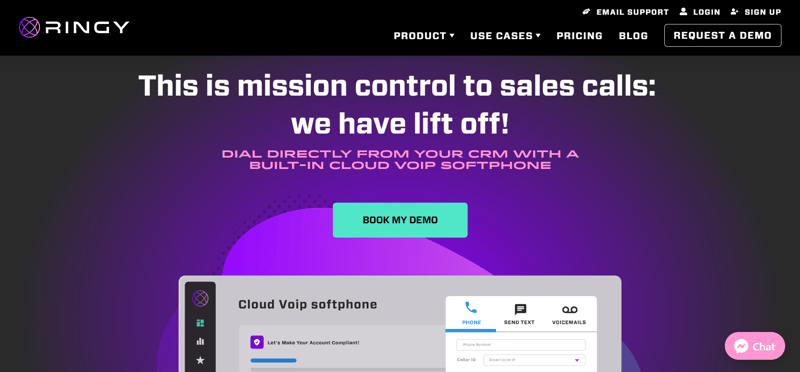
Ringy offers a comprehensive solution that combines CRM and VoIP calling capabilities, providing businesses with a cost-effective and efficient option. Our software also supports A2P 10DLC (Application-to-Person 10-Digit Long Code), a messaging standard that allows businesses to send SMS and MMS messages to customers more effectively and with higher deliverability. This makes it an excellent choice for businesses that rely on SMS for customer engagement.
Some of the features you can enjoy from our software include the following.
|
Features |
Description |
|
Click-to-Dial |
Users can easily initiate calls by clicking on a contact's number within the CRM interface, streamlining communication. |
|
Power Dialing |
This feature automates the dialing process, allowing sales teams to make more calls efficiently. |
|
SMS Functionality |
Enables text messaging within the platform, offering an additional means of communication with leads and clients. |
|
Local ID Presence Dialing |
This feature displays local phone numbers to increase answer rates, improving the chances of connecting with leads. |
|
Built-In Sales CRM |
The CRM system tool helps businesses manage their sales pipeline, track interactions, and nurture leads effectively. |
|
Marketing Automation |
Ringy offers drip campaigns, allowing businesses to automate and schedule marketing messages to engage with prospects over time. |
2. RingCentral
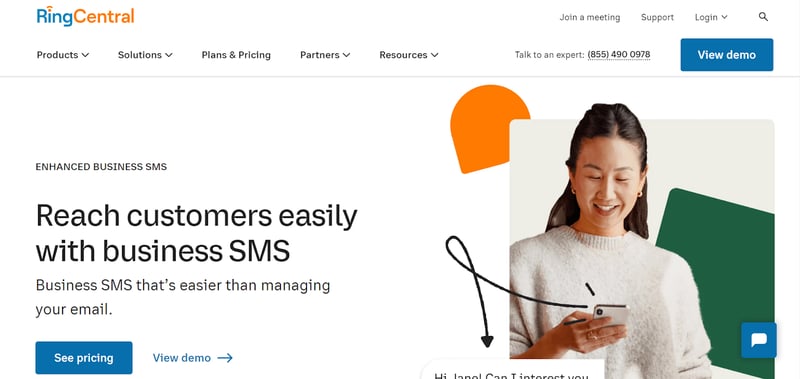
RingCentral is a well-established cloud VoIP service provider offering various communication and collaboration tools.
Key Features:
- Voice and Video Calling: Offers high-quality voice and video calls with features like call forwarding and recording.
- Team Messaging: Facilitates real-time team communication with file sharing and task management.
- Integration: Integrates with various third-party applications such as Microsoft 365 and G Suite.
- Analytics: Provides detailed call analytics and reporting for monitoring and improving communication.
- Mobile Accessibility: Allows users to stay connected on the go with mobile apps.
3. Nextiva
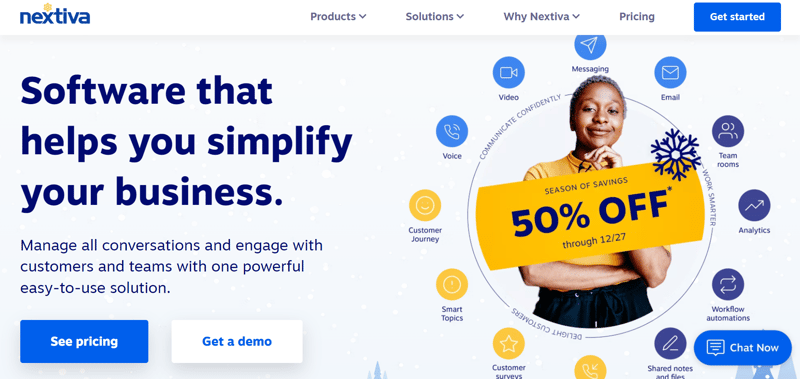
Nextiva is a VoIP cloud service provider focused on providing businesses with a unified communication platform.
Essential Features:
- Business Phone System: Offers a feature-rich business phone system with virtual extensions and auto-attendants.
- Collaboration Tools: Includes video conferencing, team messaging, and screen sharing.
- CRM Integration: Seamlessly integrates with popular CRM software to enhance customer interactions.
- Advanced Analytics: Provides in-depth insights into call performance and customer interactions.
- Customer Support: Offers excellent customer support with a reputation for high-quality service.
4. 8x8
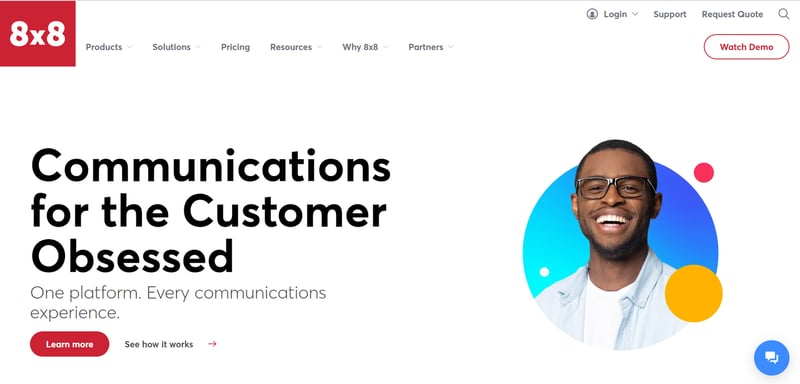
8x8 is a cloud-based VoIP service provider with comprehensive communication and collaboration solutions.
Key Features:
- Voice and Video Calling: Offers HD voice and video calling along with call recording and voicemail.
- Contact Center Solutions: Provides tools for managing customer interactions, including call queues and analytics.
- Team Messaging: Facilitates team collaboration through chat, file sharing, and task management.
- Global Reach: Offers international calling and presence in multiple countries.
- Security: Emphasizes data security and compliance with industry standards.
5. Grasshopper
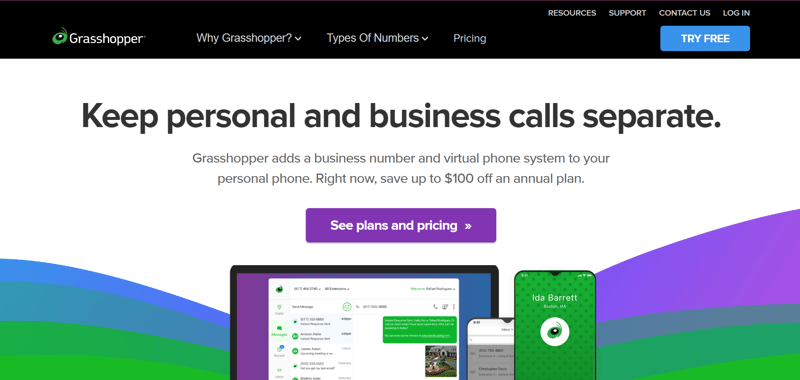
Grasshopper specializes in providing cloud-based VoIP solutions tailored for small businesses and entrepreneurs.
Key Features:
- Virtual Phone System: Offers a virtual phone system with features like call forwarding, voicemail, and custom greetings.
- Mobile App: Enables users to manage smartphone calls and messages.
- Easy Setup: Designed for quick and simple setup, making it ideal for startups.
- Professional Image: Helps small businesses project a professional image with a dedicated business phone number.
We suggest you pop these links open and take a 5-minute look around these five providers' websites while all this handy information is still fresh in your mind.
5 Cloud VoIP FAQs
.jpg?width=800&height=533&name=cloud%20based%20voip%20(1).jpg)
1. What is the Difference Between Cloud VoIP and Hosted VoIP?
Cloud VoIP and hosted VoIP are both communication solutions that utilize the internet for making voice calls, but they differ in their infrastructure and management.
Cloud VoIP, often referred to as "cloud-based VoIP," operates on a distributed network of servers hosted in data centers across various locations. It offers scalability, redundancy, and flexibility, making it suitable for businesses of all sizes.
In contrast, hosted VoIP, also known as "on-premises VoIP," relies on a single server maintained within a company's premises. It offers more control but may require significant upfront investment and maintenance. Ultimately, the choice between the two depends on a company's specific needs and preferences.
2. What Are the Disadvantages of VoIP?
Here are some disadvantages of VoIP:
- Reliability: VoIP relies on a stable internet connection. If your internet goes down or experiences significant latency or jitter, your VoIP service may suffer from dropped calls or poor call quality.
- Call Quality: The quality of VoIP calls can vary depending on your internet connection and network congestion. It may not always match the clarity of traditional landline calls.
- Emergency Services: VoIP may not always provide accurate location information to emergency services when you dial 911, which can be a critical issue in emergencies.
- Dependence on Power: VoIP phones and equipment require electricity. In case of a power outage, you may lose your phone service unless you have a backup power source.
3. Is Cloud PBX a Type of VoIP?
Yes.
Cloud PBX, or hosted PBX or cloud VoIP, is a type of internet-based phone system, which relies on a third-party service provider to host the PBX (Private Branch Exchange) offsite.
It is the opposite of using an on-premises PBX and connecting to the internet via SIP trunking.
4. How Does Cloud-Based VoIP Work?
We need to get a tiny bit technical to answer this one, but we'll do our best to keep it simple.
Cloud VoIP works by breaking your voice down into data packets, compressing them, and transmitting them via the internet to your VoIP service provider. Here, the packets pass through your provider's cloud-based PBX and get routed to your recipient.
This illustration of a cloud-based VoIP system (remember that cloud = hosted for the intents and purposes of an end-user) should help cement the concept:
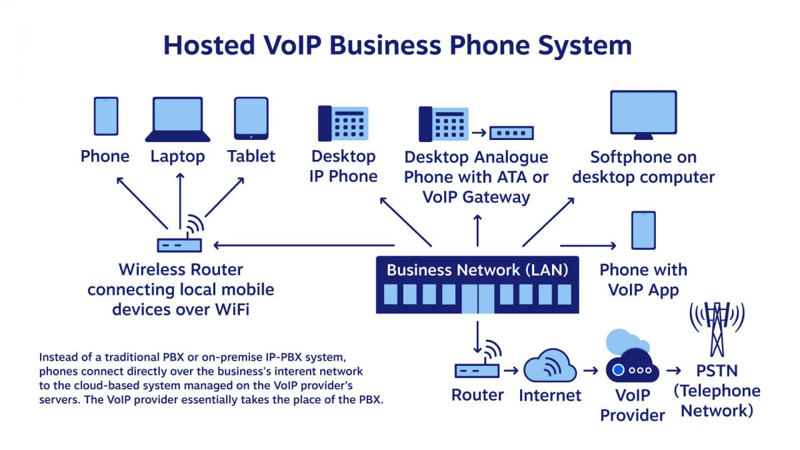
5. Is Cloud VoIP a SaaS?
Yes, absolutely.
Service providers use the SaaS (Software as a Service) model to make it as easy as possible for you to go from signing up to making VoIP calls.
They also handle the software's infrastructure and platform, so you don't need to worry about maintenance and updates.
It's a perfect model for VoIP-enabling small and medium-sized businesses. Still, large companies are also joining the cloud VoIP train to reduce costs and free up their IT teams from having to constantly maintain their on-premises PBXs.
Final Thoughts on Cloud VoIP
To sum everything up in one short sentence, we can say that:
Cloud VoIP is the 21st-century solution for flawless business communication.
We could end our post here.
But since we feel you'd benefit from one last run through the main points we raised about cloud VoIP, here's a summary to refresh your memory:
The Five Facts about Cloud VoIP
Cloud VoIP, although a modern technology, has roots dating back 50 years, showing its long history of development and evolution. In its early days, VoIP calls were supported by revenue from intrusive advertisements.
Additionally, there are two types of VoIP numbers, fixed and non-fixed, with the distinction between VoIP and traditional calls often being imperceptible. Interestingly, VoIP technology doesn't require a physical phone, highlighting its versatility and flexibility for communication needs.
The Five Benefits of Cloud VoIP
Cloud VoIP systems provide extensive advanced features like call forwarding, voicemail-to-email transcription, video conferencing, and IVR systems, enhancing communication efficiency and customer service.
Scalability is another key benefit, allowing businesses to effortlessly adjust their VoIP systems as their needs evolve, without the hassle of rewiring or expensive installations. Moreover, cloud VoIP services offer increased accessibility, enabling employees to stay connected virtually anywhere with an internet connection while delivering crystal-clear audio quality and hardware flexibility, empowering employees to choose their preferred devices for communication.
These advantages collectively make cloud-based VoIP an appealing and cost-effective choice for modern businesses seeking enhanced communication capabilities.
The Five Tips for Choosing Cloud VoIP
When considering Cloud VoIP for your business, several key factors should guide your decision-making. Pricing, features, and all-in-one solutions should be evaluated meticulously to align with your specific needs. Utilizing a mobile app is essential for convenience and remote communication.
Assessing and upgrading your bandwidth ensures a smooth transition to VoIP technology. Selecting a provider that offers more than just VoIP calling can add value to your investment. Lastly, consider whether calling groups are necessary to improve communication within your organization.
Now we're good. We can end this article with an inspirational call-to-action:
Go out there and source your team a cloud VoIP system that'll transform every single call you make into a crystal-clear conversation that costs pennies (or even less).
P.S. When you're researching potential candidates, don't forget to check out Ringy's extra features because our solution is much more than just a cloud VoIP softphone. Our bundle approach might end up saving you quite a few bucks at year-end!

Skyrocket your sales with the CRM that does it all.
Calling? Check. SMS? Check. Automation and AI? Check. Effortlessly keep in touch with your customers and boost your revenue without limits.

Take your sales to new heights with Ringy.
Sales in a slump? Ringy gives you the tools and flexibility you need to capture leads, engage with them, and turn them into customers.
Subscribe to Our Blog
Enter your email to get the latest updates sent straight to your inbox!
Categories
Related Articles

.jpg)












.jpg)




.jpg)



















































